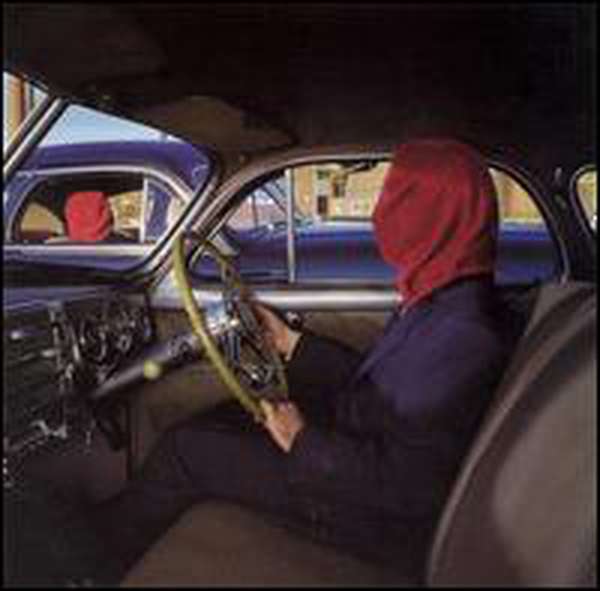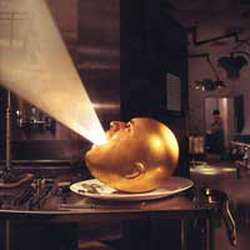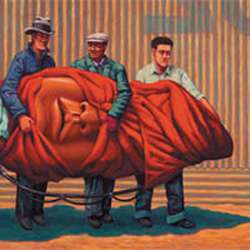Have you seen the Frances The Mute cover art yet? Cast your eyes to the right, it's on display there. Two guys, both blindfolded, and oblivious to the world around them. Or maybe they just don't care what else is going on. It's all about them, driving their vehicle, with their own rules and their own vision. That painfully obvious analogy sums up The Mars Volta's new record pretty well. Clocking in at an impressive 77 minutes, it's easily their most ambitious record to date, and is the record they've probably wanted to make since their inception.
The first noticeable prog-rock stereotype is the formatting of the tracks. Three of the five are listed with A, B, C type additions, or movements, underneath the track title, all of which are contained within the song. Pretentious? Probably. But it's hard to criticize a band when it has become apparent that they play for themselves and nobody else.
Beginning with the Bond-style title of "Cygnus...Vismund Cygnus," a deceptively quiet acoustic intro with typical Bixler lyrical offerings explodes into life with a jerking latin tinged riff. This first offering makes use of a catchy espanol pre-chorus, before one of the best vocal harmonies ever penned by Bixler. And what a chorus! It almost doesn't matter that the lyrics, inspired by a bizarre diary found by the band's former sound engineer, make less sense to me, a non Spanish speaker, than the non-English language lyrics.
One of the first things that hits you about this record, and The Mars Volta in general, is the power of the drums. In Jon Theodore they possess one of rock's most intensive and creative players, and his rumbling beats are very impressive. Bass on this record has been handled by Juan Alderete, the longtime live bassist instead of Flea, who played on the previous record, and his different style really shows through in the intense wah-bass breakdown of "Cygnus...Vismund Cygnus." However, a Mars Volta breakdown typically lasts ten minutes or more, and the song gradually fades to a lengthy guitar solo, with Omar Rodriguez-Lopez playing his typical freestyle parts, seemingly unbound by rhythm, and occasionally, melody.
Segueing out in a haze of delayed bongo samples courtesy of new official member Marcel Rodriguez-Lopez, the first track ends at just over 13 minutes. Next up is current single "The Widow." Laden with acoustic guitars and a chorus that seems to decay as soon as it begins, the contorting and yet lulling song is a high point of the record, particularly for fans who are less keen on the prog-rock length offerings. Of course, the track would not be complete without some atmospheric sounds at the end, which gently usher the listener into the fantastic "L'Via L'Viaquez."
With a rocking rhythm that's not too far from the Red Hot Chili Peppers (unsurprising, since Chilis man John Frusciante guests on this track), the wah-wah guitar in "L'Via L'Viaquez" is almost porno music, in the best possible way. Before the band are overwhelmed by the rock, the whole song deconstructs itself in typical Volta style, with revered pianist Larry Harlow adding a lounge jazz feel to the track, which somehow works well alongside soundbites of background conversation that really bring a Spanish restaurant to mind. The new performers (including cellists, violinists and a variety of horn players) mesh well with the band, with keyboard player Isaiah 'Ikey' Owens keeping it real throughout.
Fourth on the record is the less-exciting "Miranda That Ghost Just Isn't Holy Anymore." With an almost 5 minute long introduction of bird sounds, it begins to drag for the average listener before it has even begun. Taking its cue initially from Deloused In The Comatorium's "Televators," it eventually picks up with a repeated vocal line. Despite boasting a trumpet solo from Flea, the track does not make a huge impact, and before long (figuratively speaking, of course), a new theme is taken up that introduces the album's 32 minute closer, Cassandra Gemini."
Sloppy vocals introduce the track, with Bixler moaning "I think I've become one of the others" over and over. Before long the track switches into a collage of sounds along with spoken vocals, distorted and pitchshifted to achieve an eerie and yet suitable effect. Kudos is also awarded to Bixler for carrying off the lyric "She was a mink handjob." Of the entire record, this track is evidently the band's effort to capture their infamous live performances on tape, with extended jams and structure changes. The track jumps and contorts, keeping a central theme, albeit loosely, before it's ending and comedown. But oh no! They've got you, it isn't quite over yet. Some more free jazz soloing carries on as the band gradually quieten. Once more through the chorus, and then a beat of silence, before the first track's acoustic guitar makes a re-appearance, along with the same vocals and lyrics. Expecting more afterwards? Then you'll need to pick up the Frances The Mute single, which apparently 'decodes' the album.
The Mars Volta is a band that divides opinion more than the eternal debate of Spiderman vs. Wolverine. Personally I find the between-song noise and atmospheric sounds to be irritating and detracting from the music, but there are fans who insist that the band wish their records to play seamlessly, with no skipping or silence between songs. Leafing through the lyric booklet is almost like a voyage inside an acid trip. However, when these guys rock out, they don't hold up. Bizarre lyrics aside, The Mars Volta are very proficient at what they do. Employing a small orchestra of brass and string performers to play alongside them without coming off as contrived and egotistical was a great achievement. Producing a record that, while not as obviously full of songs as Deloused In The Comatorium was, showed that their creativity and lack of concern for what the listener expects them to do proves that they still exist in their own world, and can keep on doing so if it means more records like this.






